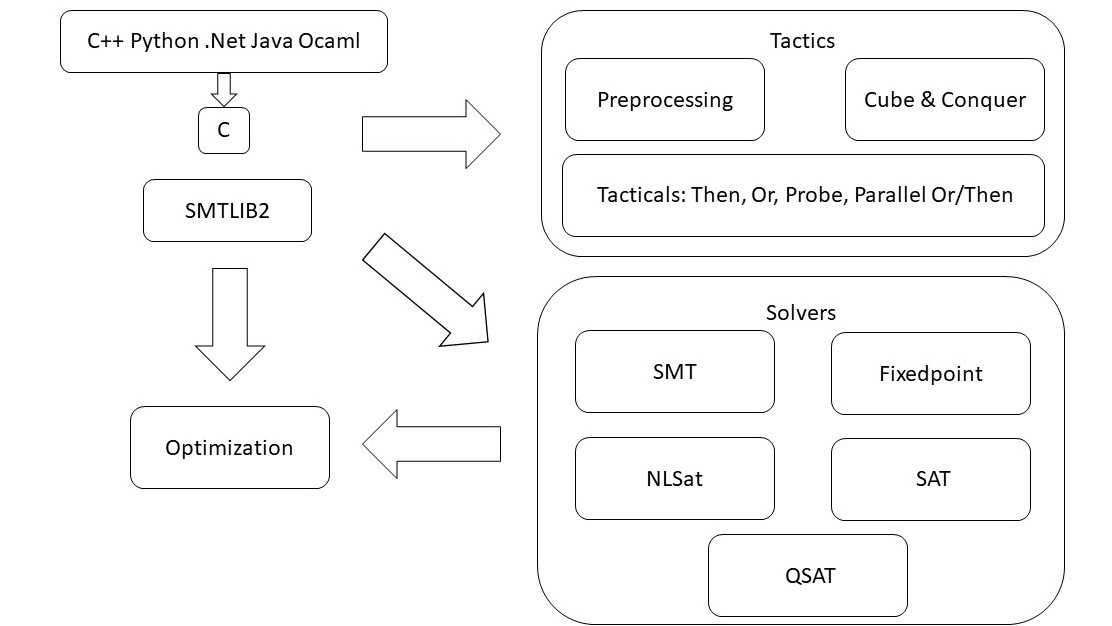Z3 is a theorem prover from Microsoft Research. It is licensed under the MIT license.
If you are not familiar with Z3, you can start here.
Pre-built binaries for stable and nightly releases are available from here.
Z3 can be built using Visual Studio, a Makefile or using CMake. It provides bindings for several programming languages.
See the release notes for notes on various stable releases of Z3.
| Azure Pipelines | Code Coverage | Open Bugs | Android Build | WASM Build | Windows Build | Pyodide Build |
|---|---|---|---|---|---|---|
32-bit builds, start with:
python scripts/mk_make.pyor instead, for a 64-bit build:
python scripts/mk_make.py -xthen:
cd build
nmakeZ3 uses C++20. The recommended version of Visual Studio is therefore VS2019.
Execute:
python scripts/mk_make.py
cd build
make
sudo make installNote by default g++ is used as the C++ compiler if it is available. If you
would prefer to use Clang change the mk_make.py invocation to:
CXX=clang++ CC=clang python scripts/mk_make.pyNote that Clang < 3.7 does not support OpenMP.
You can also build Z3 for Windows using Cygwin and the Mingw-w64 cross-compiler. To configure that case correctly, make sure to use Cygwin's own python and not some Windows installation of Python.
For a 64 bit build (from Cygwin64), configure Z3's sources with
CXX=x86_64-w64-mingw32-g++ CC=x86_64-w64-mingw32-gcc AR=x86_64-w64-mingw32-ar python scripts/mk_make.pyA 32 bit build should work similarly (but is untested); the same is true for 32/64 bit builds from within Cygwin32.
By default, it will install z3 executable at PREFIX/bin, libraries at
PREFIX/lib, and include files at PREFIX/include, where PREFIX
installation prefix is inferred by the mk_make.py script. It is usually
/usr for most Linux distros, and /usr/local for FreeBSD and macOS. Use
the --prefix= command line option to change the install prefix. For example:
python scripts/mk_make.py --prefix=/home/leo
cd build
make
make installTo uninstall Z3, use
sudo make uninstallTo clean Z3 you can delete the build directory and run the mk_make.py script again.
Z3 has a build system using CMake. Read the README-CMake.md file for details. It is recommended for most build tasks, except for building OCaml bindings.
vcpkg is a full platform package manager, you can easily install libzmq with vcpkg.
Execute:
git clone https://github.com/microsoft/vcpkg.git
./bootstrap-vcpkg.bat # For powershell
./bootstrap-vcpkg.sh # For bash
./vcpkg install z3Z3 itself has few dependencies. It uses C++ runtime libraries, including pthreads for multi-threading. It is optionally possible to use GMP for multi-precision integers, but Z3 contains its own self-contained multi-precision functionality. Python is required to build Z3. To build Java, .Net, OCaml, Julia APIs requires installing relevant tool chains.
Z3 has bindings for various programming languages.
You can install a nuget package for the latest release Z3 from nuget.org.
Use the --dotnet command line flag with mk_make.py to enable building these.
See examples/dotnet for examples.
These are always enabled.
See examples/c for examples.
These are always enabled.
See examples/c++ for examples.
Use the --java command line flag with mk_make.py to enable building these.
See examples/java for examples.
Use the --ml command line flag with mk_make.py to enable building these.
See examples/ml for examples.
You can install the Python wrapper for Z3 for the latest release from pypi using the command:
pip install z3-solverUse the --python command line flag with mk_make.py to enable building these.
Note that it is required on certain platforms that the Python package directory
(site-packages on most distributions and dist-packages on Debian based
distributions) live under the install prefix. If you use a non standard prefix
you can use the --pypkgdir option to change the Python package directory
used for installation. For example:
python scripts/mk_make.py --prefix=/home/leo --python --pypkgdir=/home/leo/lib/python-2.7/site-packagesIf you do need to install to a non standard prefix a better approach is to use
a Python virtual environment
and install Z3 there. Python packages also work for Python3.
Under Windows, recall to build inside the Visual C++ native command build environment.
Note that the build/python/z3 directory should be accessible from where python is used with Z3
and it depends on libz3.dll to be in the path.
virtualenv venv
source venv/bin/activate
python scripts/mk_make.py --python
cd build
make
make install
# You will find Z3 and the Python bindings installed in the virtual environment
venv/bin/z3 -h
...
python -c 'import z3; print(z3.get_version_string())'
...See examples/python for examples.
The Julia package Z3.jl wraps the C API of Z3. A previous version of it wrapped the C++ API: Information about updating and building the Julia bindings can be found in src/api/julia.
A WebAssembly build with associated TypeScript typings is published on npm as z3-solver. Information about building these bindings can be found in src/api/js.
Project MachineArithmetic provides Smalltalk interface to Z3's C API. For more information, see MachineArithmetic/README.md
-
Default input format is SMTLIB2
-
Other native foreign function interfaces:
-
Python API (also available in pydoc format)
-
C
-
OCaml
-
Smalltalk (supports Pharo and Smalltalk/X)
- The Axiom Profiler currently developed by ETH Zurich

